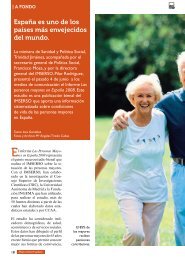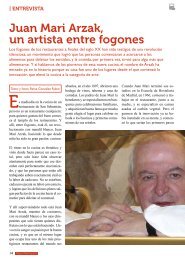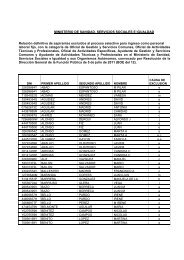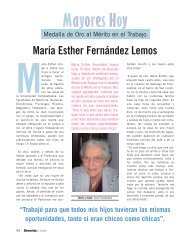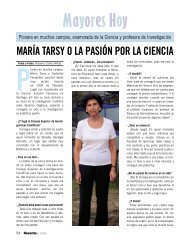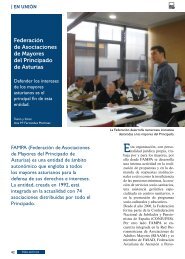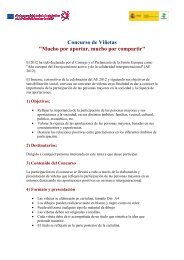Texto Completo de la Publicación (1107 Kb. pdf) - Imserso
Texto Completo de la Publicación (1107 Kb. pdf) - Imserso
Texto Completo de la Publicación (1107 Kb. pdf) - Imserso
- No tags were found...
You also want an ePaper? Increase the reach of your titles
YUMPU automatically turns print PDFs into web optimized ePapers that Google loves.
ESTUDIO E INTERVENCIÓN SOBRE EL MALESTAR PSICOLÓGICO…<br />
204<br />
Ped<strong>la</strong>r, D.J. y Biegel, D.E. (1999). The Impact of Family Caregiver Attitu<strong>de</strong>s on the Use of Community<br />
Services for Dementia Care. The Journal of Applied Gerontology, 18, 201-221.<br />
Peinado, A.I. y Garcés, E.J. (1998). Burnout en cuidadores principales <strong>de</strong> pacientes con Alzheimer. El síndrome<br />
<strong>de</strong>l asistente <strong>de</strong>sasistido. Anales <strong>de</strong> Psicología, 14(1), 83-93.<br />
Penning, M.J. (2002). In the middle: Parental caregiving in the context of other roles. Journals of<br />
Gerontology: Series B: Psychological Sciences and Social Sciences, 53B(4), S188-S197.<br />
Pérez L. (2002). Indicadores sociales. En IMSERSO, Envejecer en España (pp. 63-82). Madrid:<br />
IMSERSO.<br />
Pillemer, K., Suitor, J. y Wethington, E. (2003). Integrating Theory, Basic Research, and Intervention: Two<br />
Case Studies From Caregiving Research. The Gerontologist, 43, Special Issue 1, 19-28.<br />
Pinquart, M. y Sörensen, S. (2001). How effective are psychotherapeutic and other psychosocial interventions<br />
with ol<strong>de</strong>r adults. A meta-analysis. Journal of Mental Health and Aging, 7, 207-243.<br />
Pinquart, M. y Sörensen, S. (2003). Differences Between Caregivers and Noncaregivers in Psychological<br />
Health and Physical Health: A Meta-Analysis. Psychology and Aging, 18(2), 250-267.<br />
Poggiolini, D. (1996). Report on Alzheimer Disease. European Parliament. Meeting Document A4-<br />
0051/96, PE215.515.<br />
Pou<strong>la</strong>kis, Z. y Wertheim, E.H. (1993). Re<strong>la</strong>tionships among dysfunctional cognitions, <strong>de</strong>pressive symptoms,<br />
and bulimic ten<strong>de</strong>ncies. Cognitive Therapy and Research, 17, 549-559.<br />
Powers, D.V., Gal<strong>la</strong>gher-Thompson, D. y Kraemer, H.C. (2002). Coping and Depression in Alzheimer’s<br />
Caregivers: Longitudinal Evi<strong>de</strong>nce of Stability. Journal of Gerontology: Psychological Sciences,<br />
57B(3), 205-211.<br />
Pratt, C., Schmall, V., Wright, S. y Cle<strong>la</strong>nd, M. (1985). Bur<strong>de</strong>n and coping strategies of caregivers to Alzheimer´s<br />
patients. Family Re<strong>la</strong>tions, 34, 27-33.<br />
Priel, B. y Shahar, G. (2000). Depen<strong>de</strong>ncy, self-criticism, social context and distress: Comparing mo<strong>de</strong>rating<br />
and mediating mo<strong>de</strong>ls. Personality and Individual Differences, 28, 515-525.<br />
Prochaska, J.O. y DiClemente, C.C. (1984). The transtheorical approach: crossing traditional boundaries<br />
of change. Homewood: Dow Jones/Irwin.<br />
Prochaska, J.O., Johnson, S.S. y Lee, P. (1998). The Transtheorical Mo<strong>de</strong>l of behavior change. In: E. Schron,<br />
J. Ockene, S. Schumaker y W.M. Exum (Eds.), The handbook of behavioral change (2nd ed.)(pp.<br />
159-184). New Yorrk: Springer.<br />
Proctor, R., Martin, C. y Hewison, J. (2002). When a little knowledge is a dangerous thing …: a study of<br />
carers’ knowledge about <strong>de</strong>mentia, preferred coping style and psychological distress. International<br />
Journal of Geriatric Psychiatry, 17, 1133-1139.<br />
Pruchno, R.A., Kleban, M.H., Michaels, J.E. y Dempsey, N.P. (1990). Mental and Physical Health of Caregiving<br />
Spouses: Development of a Causal Mo<strong>de</strong>l. Journal of Gerontology: Psychological Sciences,<br />
45, 192-199.



